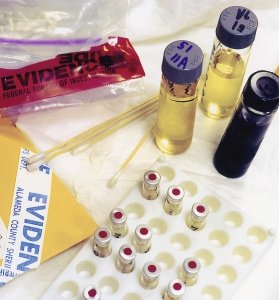Medico-legal investigations of death and poisoning are sometimes a source of trouble for the analysts, depending on the source of the poisoning that has deadly affected the subject, out of which many can be intelligently enough created to be difficult to diagnose. This is when a forensic toxicologist is needed in order to identify the cause of the specific lesions that caused the death of the subject. The domains of expertise that a specialist in forensic toxicology must have are pharmacology, analytical chemistry and clinical chemistry.

The main preoccupation of the specialists in the field concerns obtaining and interpreting the results of the toxicological outcome of the investigation more than the legal outcome itself. The forensic toxicologist will, therefore, consider the context of the investigation that takes place after an incident, including any physical symptoms, the evidence collected at the crime scene that can restrict the case examination. Any chemical container or trace residues are vital for the approach of the investigation, which is why any forensic toxicologist will first follow the indices found at crime scene. Of course, narrowing the investigation can only work if the identified clues are found to have been consumed by the victim in sufficient concentration to have had a major effect on the subject.

The ‘terrain’ of examination for the forensic toxicologists consists most often in bodily fluids and tissue samples, where they have to examine the substances that can be identified. Determining which substance in what quantities have been consumed is a very hard task in some cases, since most of the chemicals don’t remain in the original form once ingested. Heroin, for instance, gets transformed into morphine if the investigation isn’t held shortly after the ingestion has taken place. The ADME (the acronym stands for Absorption, Distribution, Metabolism and Excretion) is very different from a substance to another, having a major impact on the drug levels and the kinetics of drug exposure to the tissues, as well as on the chemical reaction of the substance as a drug.
For the investigation to take place, it is highly important that the forensic toxicologist isolates and identifies any substances that the body might have entered in contact with, such as: alcohol, illegal or prescription drugs, poisons, metals and gases (the most common example being carbon monoxide). Because of the changes of the substances once ingested by the boy, it is highly important that the specialist is very patient in collecting and analyzing the fatal substance or combination. The chain of custody for the physical examination is one of the most essential sets of rules that have to be taken into consideration once the investigation has begun, reason for which documentation is another key step in solving the case.
 Another activity where the forensic toxicologists have to be very careful in analyzing the results of the substance combinations is on cases involving environmental contamination, especially if the trials involve large amounts of money and political interests on both sides, because the final report has to be even more clearly made. The methodologies used in putting together the information in order to get to the results must be explained in court in case any of the parts asks for it, and the justification has to be made in such terms that the juries can understand, avoiding the specific terms as much as possible and making the analysis seem very clear for all the ones attending, without giving any reasons to doubt.
Another activity where the forensic toxicologists have to be very careful in analyzing the results of the substance combinations is on cases involving environmental contamination, especially if the trials involve large amounts of money and political interests on both sides, because the final report has to be even more clearly made. The methodologies used in putting together the information in order to get to the results must be explained in court in case any of the parts asks for it, and the justification has to be made in such terms that the juries can understand, avoiding the specific terms as much as possible and making the analysis seem very clear for all the ones attending, without giving any reasons to doubt.
Concerning the employer those specialists work for, it does depend from a state to another, since the trial meetings have significant differences, but most of them work in laboratories run by law enforcement agencies, medical examiners or private drug testing facilities. This ‘project-based’ work has its flaws, since they get to have even months with nothing to do. Nonetheless, when a case occurs, they have to be very precise in following the scientific protocols and procedures, yet very careful and never hasty in their analysis. Effective prioritizing is, therefore, very important in their work, since they can’t afford to lose touch while there are no open cases to be solved.
This is a classic example of job in which you cannot survive without true passion for the field and sincere interest on the effects of chemicals on human body, since constant learning is demanded for the specialists, on methodologies, technologies and new substances and their effects as well. The programs followed have to be accredited by the National Institute of Forensic Science of the country in which the forensic toxicologist wants to work. In the United States of America some of the most appreciated institutions that provide the certification are The American Board of Forensic Toxicology, the American Board of Toxicology and the American Board of Clinical Chemistry.



